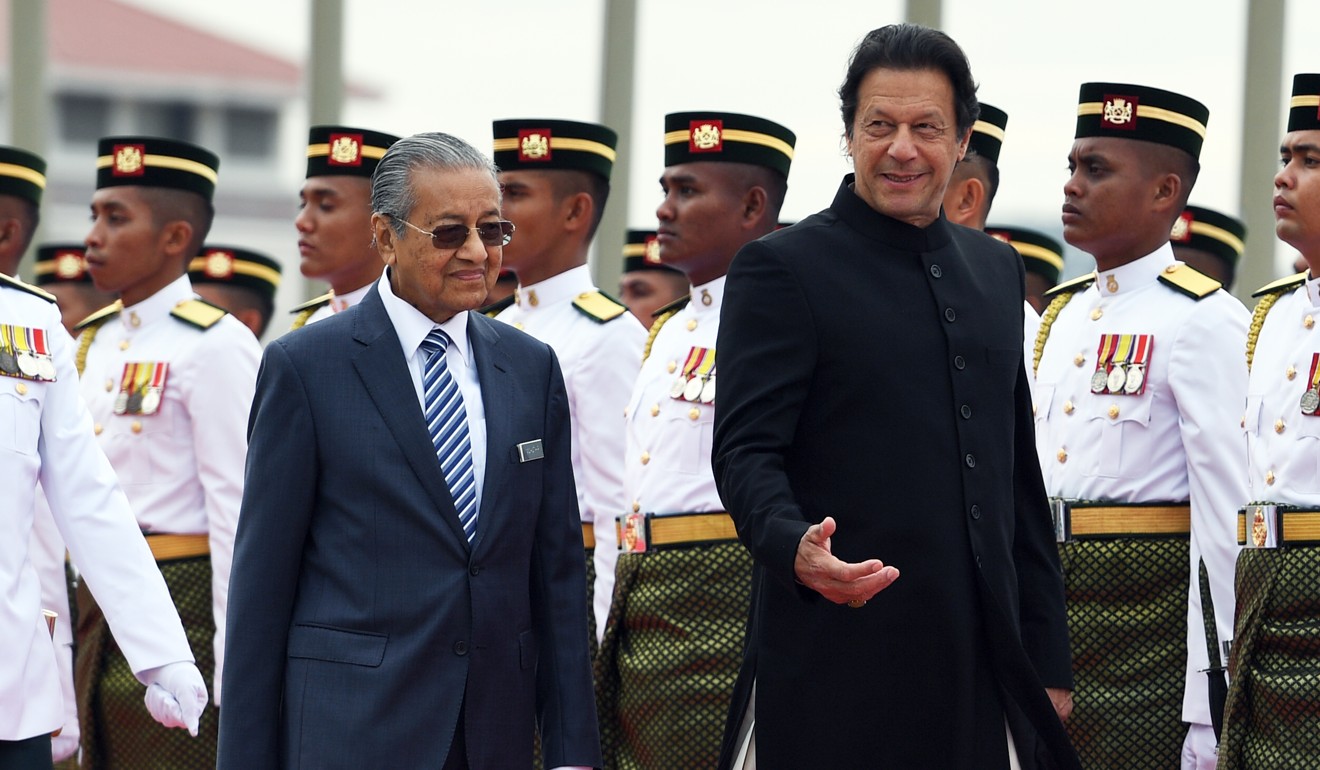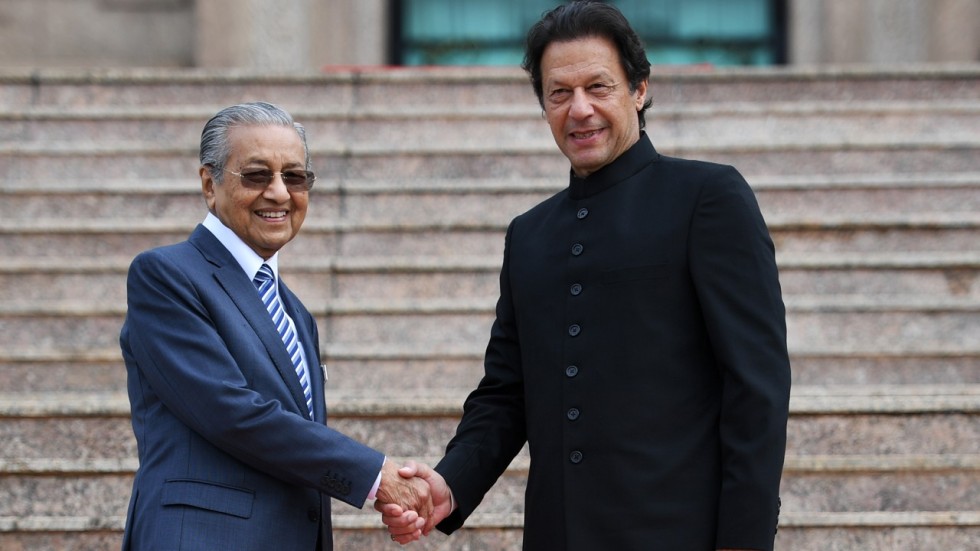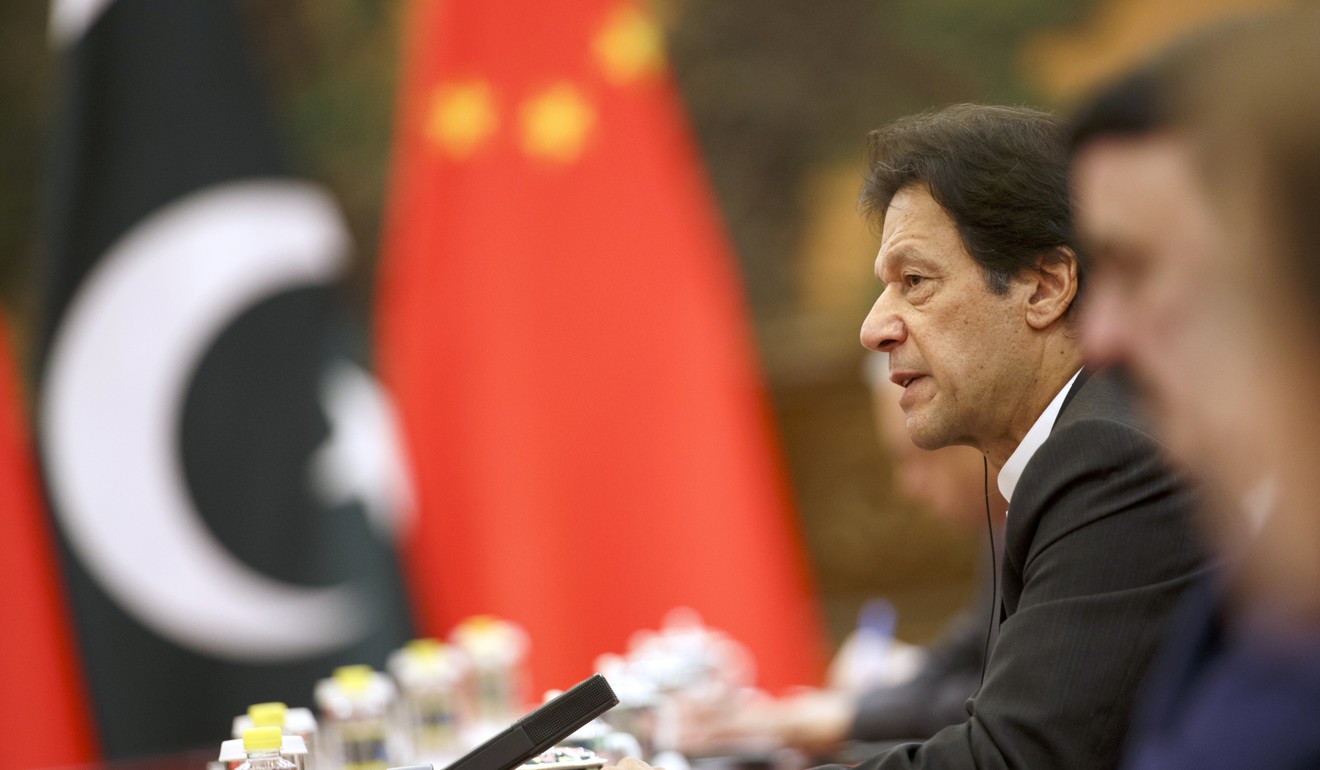New Pakistani Prime Minister Imran Khan and Malaysia’s Mahathir Mohamad say they face similar situations of ‘unprecedented debt’
The announcement came as Pakistan’s new prime minister, Imran Khan, wrapped up his first visit to Kuala Lumpur since coming to office in August.
The move by the two Muslim-majority nations follows concerns over growing levels of Chinese-linked sovereign debt, which became a hot-button issue in elections in both countries earlier this year.
On coming to office Malaysian Prime Minister Mahathir Mohamad cancelled some US$22 billion worth of Chinese projects, saying they were unnecessary and too expensive, while Khan has asked Beijing for significant shifts in the infrastructure projects agreed to as part of the US$60 billion China-Pakistan Economic Corridor (CPEC), a keystone of Beijing’s “Belt and Road Initiative”.
Both leaders also made anti-corruption measures a central plank of their campaign platforms.
Khan, who received a rock-star welcome upon his arrival in Malaysia on Wednesday – a welcome that included an audience with the country’s acting king – said Malaysia and Pakistan were “in similar positions”.
What Malaysia’s Mahathir really plans for China-backed projects
“We [Mahathir and I] both came into power after the people gave us a mandate on an anti-corruption platform. We face similar situations of unprecedented debt and so have a lot to share and talk about on dealing with the crisis and how to come out of it,” he said.
Khan added that Islamabad viewed Mahathir with admiration for how he had helped Malaysia develop, both during his first stint in power (from 1981 to 2003) and in his second stint since his shock victory in the general election in May.
“We hope to learn from your experience,” Khan added.
Mahathir also said he and Khan had discussed the problems and “ways and means of tackling” them during a one-on-one meeting.
The South China Morning Post understands that during these meetings, Pakistan did not ask Malaysia for a loan as it has done with Saudi Arabia and China. Instead, the leaders discussed ways to boost the tourism sector in Pakistan, Pakistan’s involvement in the Association of Southeast Asian Nations (Asean), and ways to improve bilateral business ties.
Mahathir brought up Malaysia’s long, mostly close relationship with Pakistan, saying he would be working to bring Pakistan in as a dialogue partner within Asean – a market Islamabad has been keenly eyeing.
Forget the US$23 billion question. China-Malaysia ties are strong
In a later speech, he noted the “remarkable similarities” between the two nations, described Khan’s visit as a major milestone and said he hoped the 2007 Malaysia-Pakistan Closer Economic Partnership Agreement could be fully exploited.
Mahathir also reiterated Malaysia’s commitment to helping Pakistan address its energy shortfall – an issue that the CPEC was meant to address through multiple power generation and transmission projects.
The backing from Malaysia comes at an opportune time for Pakistan, which recently asked the International Monetary Fund for a US$8 billion bailout – its second since 2013 – to stabilise its economy. The request has put Islamabad in an awkward position due to a precondition set by the IMF, which has asked it for complete disclosure of its Chinese financial support. Islamabad will find it hard to comply as doing so would risk angering China.
Even so, officials in Islamabad believe a final agreement with the IMF will be reached by mid-January. The country has devalued its currency five times and hiked the main interest rate by 275 basis points to 8.5 per cent since January.

Strategic studies expert Ravichandran Dhakshinamoorthy, from the National University of Malaysia, said Malaysia and Pakistan had long enjoyed good ties, with Pakistan being among the first to recognise Malaysia as a nation after it gained independence in 1957.
“Pakistan and Malaysia have also cooperated through various Organisation of Islamic Cooperation initiatives. However, our experiences with China are very different. Malaysia took a while to normalise its relations, while Sino-Pakistan relations have been good from the get-go especially as China is one of Pakistan’s largest weapons suppliers and both have a common mistrust of India.
“However, with the CPEC investments came the question of whether Pakistan will be able to pay back its debt, and I believe that the answer is no. China is progressive in that it is investing in areas nobody wants to go to – but they have their own interests,” he said.
“Meanwhile, Pakistan is benefiting from Chinese investment because it is almost free, but it must be asked if they are pawning their sovereignty away.”
In contrast, the expert said Malaysia had said “no” and held back on some Chinese-backed projects.
Mahathir Mohamad. Malaysia’s anti-China rebel? Not so fast …
Ngeow Chow Bing of University Malaya’s Institute of China Studies echoed this. “Pakistan-China relations are very strongly founded and, more importantly, the Pakistani military remains staunchly pro-China. Both Imran and Mahathir are readjusting their respective China policies, to make their countries’ ties with China more sustainable, but not necessarily keeping China away,” he said.
After leading the Pakatan Harapan coalition to power in May – a move that ended 61 years of rule by the rival Barisan Nasional alliance – Mahathir put a swift end to controversial China-backed projects agreed under the watch of his predecessor, the now-disgraced Najib Razak, who is facing a slew of corruption charges linked to a financial scandal at the state fund 1Malaysia Development Berhad, or 1MDB.
Mahathir suspended the US$20 billion East Coast Rail Link as well as a natural gas pipeline project in the resource-rich East Malaysian state of Sabah. He described some of the deals signed by his predecessor as “unfair”. After a congenial trip to China, he said Beijing had been understanding of the problems inherited by the new government, which is still working to counteract the consequences of massive alleged corruption under the previous administration.
Allegations of China partaking in “debt-trap diplomacy” from the international community have pushed Beijing to draft regulations to improve its management and administration of foreign aid. These are available for public comment on the website of the China International Development Cooperation Agency until late December.



